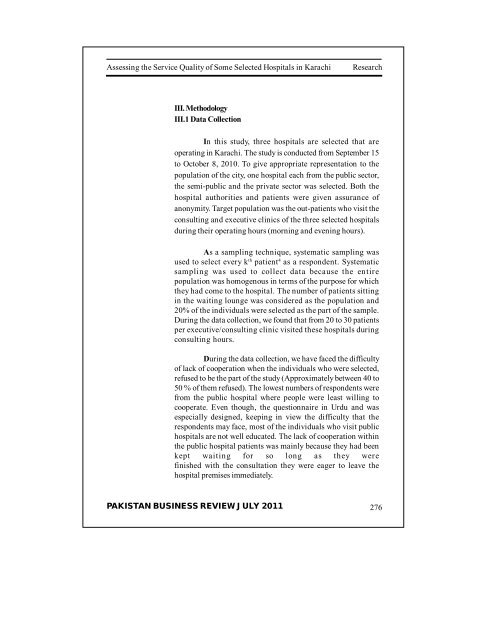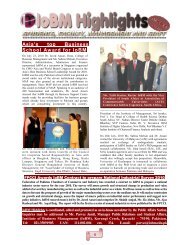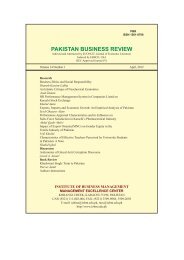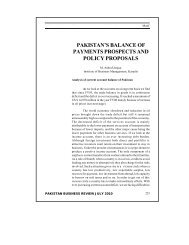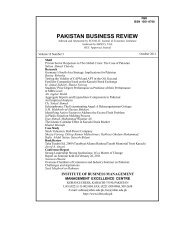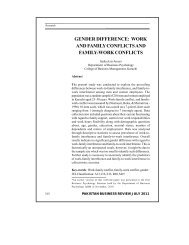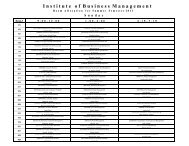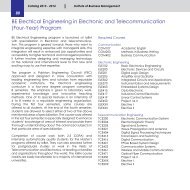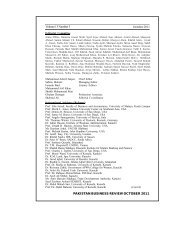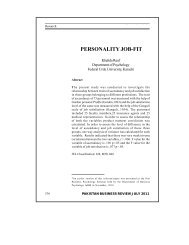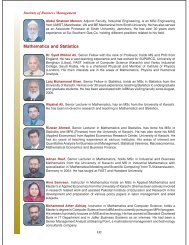PAKISTAN BUSINESS REVIEW - Institute of Business Management
PAKISTAN BUSINESS REVIEW - Institute of Business Management
PAKISTAN BUSINESS REVIEW - Institute of Business Management
You also want an ePaper? Increase the reach of your titles
YUMPU automatically turns print PDFs into web optimized ePapers that Google loves.
Assessing the Service Quality <strong>of</strong> Some Selected Hospitals in Karachi<br />
Research<br />
III. Methodology<br />
III.1 Data Collection<br />
In this study, three hospitals are selected that are<br />
operating in Karachi. The study is conducted from September 15<br />
to October 8, 2010. To give appropriate representation to the<br />
population <strong>of</strong> the city, one hospital each from the public sector,<br />
the semi-public and the private sector was selected. Both the<br />
hospital authorities and patients were given assurance <strong>of</strong><br />
anonymity. Target population was the out-patients who visit the<br />
consulting and executive clinics <strong>of</strong> the three selected hospitals<br />
during their operating hours (morning and evening hours).<br />
As a sampling technique, systematic sampling was<br />
used to select every k th patient 4 as a respondent. Systematic<br />
sampling was used to collect data because the entire<br />
population was homogenous in terms <strong>of</strong> the purpose for which<br />
they had come to the hospital. The number <strong>of</strong> patients sitting<br />
in the waiting lounge was considered as the population and<br />
20% <strong>of</strong> the individuals were selected as the part <strong>of</strong> the sample.<br />
During the data collection, we found that from 20 to 30 patients<br />
per executive/consulting clinic visited these hospitals during<br />
consulting hours.<br />
During the data collection, we have faced the difficulty<br />
<strong>of</strong> lack <strong>of</strong> cooperation when the individuals who were selected,<br />
refused to be the part <strong>of</strong> the study (Approximately between 40 to<br />
50 % <strong>of</strong> them refused). The lowest numbers <strong>of</strong> respondents were<br />
from the public hospital where people were least willing to<br />
cooperate. Even though, the questionnaire in Urdu and was<br />
especially designed, keeping in view the difficulty that the<br />
respondents may face, most <strong>of</strong> the individuals who visit public<br />
hospitals are not well educated. The lack <strong>of</strong> cooperation within<br />
the public hospital patients was mainly because they had been<br />
kept waiting for so long as they were<br />
finished with the consultation they were eager to leave the<br />
hospital premises immediately.<br />
<strong>PAKISTAN</strong> <strong>BUSINESS</strong> <strong>REVIEW</strong> JULY 2011<br />
276


